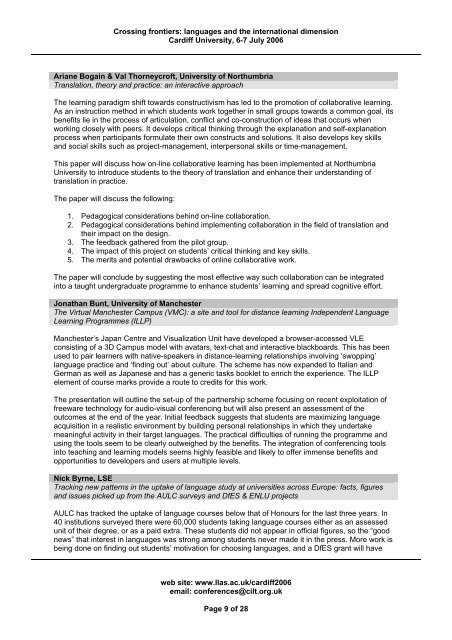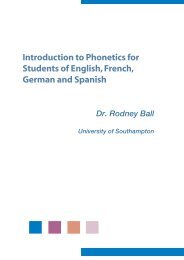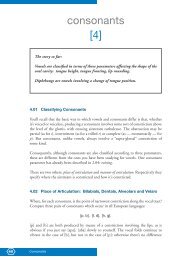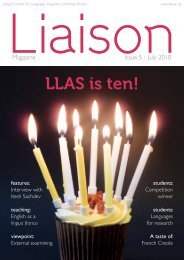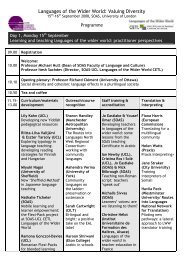Crossing frontiers: Languages and the international dimension
Crossing frontiers: Languages and the international dimension
Crossing frontiers: Languages and the international dimension
Create successful ePaper yourself
Turn your PDF publications into a flip-book with our unique Google optimized e-Paper software.
<strong>Crossing</strong> <strong>frontiers</strong>: languages <strong>and</strong> <strong>the</strong> <strong>international</strong> <strong>dimension</strong><br />
Cardiff University, 6-7 July 2006<br />
Ariane Bogain & Val Thorneycroft, University of Northumbria<br />
Translation, <strong>the</strong>ory <strong>and</strong> practice: an interactive approach<br />
The learning paradigm shift towards constructivism has led to <strong>the</strong> promotion of collaborative learning.<br />
As an instruction method in which students work toge<strong>the</strong>r in small groups towards a common goal, its<br />
benefits lie in <strong>the</strong> process of articulation, conflict <strong>and</strong> co-construction of ideas that occurs when<br />
working closely with peers. It develops critical thinking through <strong>the</strong> explanation <strong>and</strong> self-explanation<br />
process when participants formulate <strong>the</strong>ir own constructs <strong>and</strong> solutions. It also develops key skills<br />
<strong>and</strong> social skills such as project-management, interpersonal skills or time-management.<br />
This paper will discuss how on-line collaborative learning has been implemented at Northumbria<br />
University to introduce students to <strong>the</strong> <strong>the</strong>ory of translation <strong>and</strong> enhance <strong>the</strong>ir underst<strong>and</strong>ing of<br />
translation in practice.<br />
The paper will discuss <strong>the</strong> following:<br />
1. Pedagogical considerations behind on-line collaboration.<br />
2. Pedagogical considerations behind implementing collaboration in <strong>the</strong> field of translation <strong>and</strong><br />
<strong>the</strong>ir impact on <strong>the</strong> design.<br />
3. The feedback ga<strong>the</strong>red from <strong>the</strong> pilot group.<br />
4. The impact of this project on students’ critical thinking <strong>and</strong> key skills.<br />
5. The merits <strong>and</strong> potential drawbacks of online collaborative work.<br />
The paper will conclude by suggesting <strong>the</strong> most effective way such collaboration can be integrated<br />
into a taught undergraduate programme to enhance students’ learning <strong>and</strong> spread cognitive effort.<br />
Jonathan Bunt, University of Manchester<br />
The Virtual Manchester Campus (VMC): a site <strong>and</strong> tool for distance learning Independent Language<br />
Learning Programmes (ILLP)<br />
Manchester’s Japan Centre <strong>and</strong> Visualization Unit have developed a browser-accessed VLE<br />
consisting of a 3D Campus model with avatars, text-chat <strong>and</strong> interactive blackboards. This has been<br />
used to pair learners with native-speakers in distance-learning relationships involving ‘swopping’<br />
language practice <strong>and</strong> ‘finding out’ about culture. The scheme has now exp<strong>and</strong>ed to Italian <strong>and</strong><br />
German as well as Japanese <strong>and</strong> has a generic tasks booklet to enrich <strong>the</strong> experience. The ILLP<br />
element of course marks provide a route to credits for this work.<br />
The presentation will outline <strong>the</strong> set-up of <strong>the</strong> partnership scheme focusing on recent exploitation of<br />
freeware technology for audio-visual conferencing but will also present an assessment of <strong>the</strong><br />
outcomes at <strong>the</strong> end of <strong>the</strong> year. Initial feedback suggests that students are maximizing language<br />
acquisition in a realistic environment by building personal relationships in which <strong>the</strong>y undertake<br />
meaningful activity in <strong>the</strong>ir target languages. The practical difficulties of running <strong>the</strong> programme <strong>and</strong><br />
using <strong>the</strong> tools seem to be clearly outweighed by <strong>the</strong> benefits. The integration of conferencing tools<br />
into teaching <strong>and</strong> learning models seems highly feasible <strong>and</strong> likely to offer immense benefits <strong>and</strong><br />
opportunities to developers <strong>and</strong> users at multiple levels.<br />
Nick Byrne, LSE<br />
Tracking new patterns in <strong>the</strong> uptake of language study at universities across Europe: facts, figures<br />
<strong>and</strong> issues picked up from <strong>the</strong> AULC surveys <strong>and</strong> DfES & ENLU projects<br />
AULC has tracked <strong>the</strong> uptake of language courses below that of Honours for <strong>the</strong> last three years. In<br />
40 institutions surveyed <strong>the</strong>re were 60,000 students taking language courses ei<strong>the</strong>r as an assessed<br />
unit of <strong>the</strong>ir degree, or as a paid extra. These students did not appear in official figures, so <strong>the</strong> “good<br />
news” that interest in languages was strong among students never made it in <strong>the</strong> press. More work is<br />
being done on finding out students’ motivation for choosing languages, <strong>and</strong> a DfES grant will have<br />
web site: www.llas.ac.uk/cardiff2006<br />
email: conferences@cilt.org.uk<br />
Page 9 of 28


